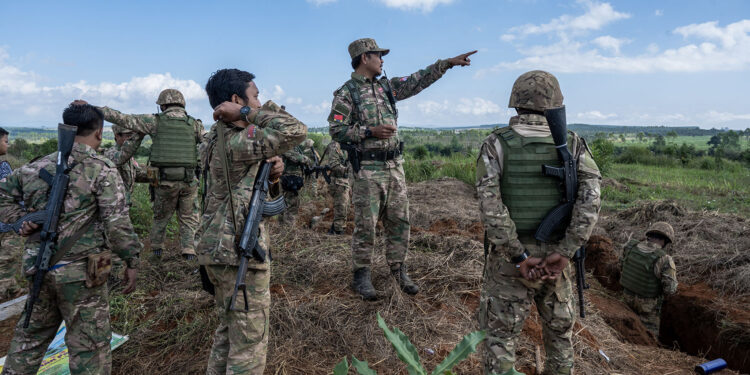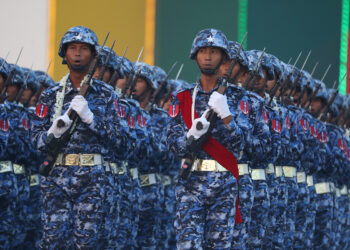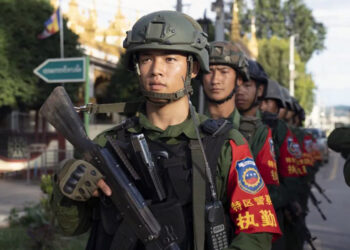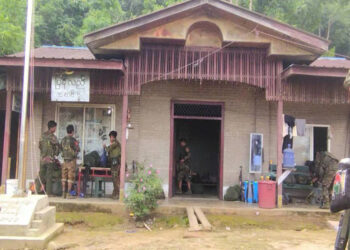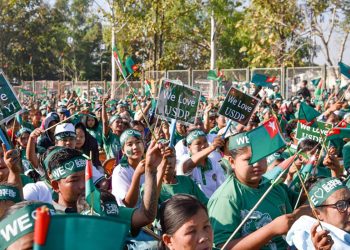For decades, Myanmar’s legal system has been used as a tool of repression by those who control it – first by colonial powers and then successive military juntas. Since the 2021 military coup, resistance to military rule is stronger than ever. In response, the number of political prisoners detained by the military has surpassed the previous decades of military rule combined. My organization, the Assistance Association for Political Prisoners (AAPP), has recorded that since 2021, 28,526 political prisoners have been arrested, while 21,792 remain incarcerated. These numbers are likely to be much higher on the ground.
The weaponization of law
A legal system must be in place to uphold dignity and promote human rights, not the other way around. A country that upholds human rights should have laws that protect individuals, ensure justice, equality, and fundamental freedoms for all its people, as laid out in international conventions and frameworks.
Instead, in Myanmar the military regime manipulates its legal framework to silence dissent, criminalize resistance, and maintain control. Criminal prosecutions are enforced through Myanmar’s penal code and special laws. The penal code dates back to colonial times, implemented to maintain order among the colonized population, prevent resistance, and facilitate governance according to the ruler’s interests. Over time, successive juntas have weaponized these laws, amending their terminology, offenses, and penalties to arrest and detain political prisoners. Meanwhile, the judiciary and law enforcement agencies operate in alignment with the junta’s oppressive policies, largely controlled by the military itself and engaging in corruption for their own benefit.
After Myanmar gained independence, rather than reforming colonial-era laws, governments left them largely unchanged. No significant amendment or draft was made to the 1947 Constitution, to align with democratic principles or international human rights standards.
Instead, laws were primarily enacted to reinforce government control and counter perceived threats from political opposition and armed resistance movements, like the Public Order (Preservation) Act of 1947. Regimes expanded legal frameworks that allowed for stricter surveillance, suppression of dissent, and increased state authority over political affairs.
The start of military rule in 1962 only meant the number of repressive laws in the country increased. Many new laws were enacted or amended with the primary goal of prolonging military rule and suppressing opposition. This included the Special Criminal Court Law (1962), the Printers and Publishers Registration Law (1962), and The Myanmar Citizenship Law (1982), among others.
Despite Myanmar’s transition to a multiparty democracy after 2010, significant changes to the legal framework were not implemented to align laws with democratic principles and global human rights standards. Under the National League for Democracy (NLD) led by Daw Aung San Suu Kyi, 89 laws were either amended or enacted. However, the 2008 Constitution, drafted by the junta, preserved significant military control over political affairs, restricting the NLD’s ability to amend laws and advance democratic reforms.
Legislating fear after the 2021 coup
Since the military coup on February 1, 2021, the junta has continued amending existing laws and enacting new legislation to criminalize dissent, empowering security forces to arbitrarily arrest resistant individuals and their families.
Most significantly, the military added a new section to the Penal Code: Section 505 A, which criminalizes any form of speech, writing, or actions that could be interpreted as “causing fear” or “spreading misinformation” against the military. The broad language used allows the military to arrest anyone at their will. The coup’s aftermath saw the military systematically use Penal Code 505A to arrest and sentence those that resisted them. As of Feb. 9 this year, AAPP has logged at least 7,630 political prisoners detained under Penal Code Section 505 A.
Recently, the military has increasingly used sections of the Counter-Terrorism Law to detain political prisoners, allowing longer sentences compared to Section 505A. Under this law, political prisoners typically receive prison sentences of over 10 years – but many have faced life imprisonment or even the death penalty. Rather than clearly defining the term terrorism, definitions are broad and ambiguous, with vague and biased concepts such as “exhortation, persuasion, and propaganda.” They can therefore be applied selectively. AAPP has recorded at least 7,780 political prisoners detained under the Counter-Terrorism Law since the military coup, although this number is likely to be much higher.
The body of repressive laws in the military’s playbook is expansive, built up over time to become a powerful mechanism of repression. Other laws being systematically used to detain political prisoners include the Unlawful Association Act and Arms Law.
Many laws – most notably the Telecommunications Law and the Printing and Publishing Law – seek to restrict media and individual freedom of expression. Meanwhile, a free and open civil space is suppressed through the Law Relating to Registration of Associations, among others. Civilians face surveillance and limited freedom of movement through laws such as the Ward and Village Tract Administration Law. The recently enacted Cybersecurity Law has only tightened the junta’s control over communication and public opinion.
Across the board, the military applies these laws to target freedom, democracy, equality and human rights. They lack clear definitions that allow them to be applied fairly. Sentences are disproportionate to the act. AAPP has recorded 125 individuals sentenced to death under the Counter-Terrorism Law, and another 414 to life in prison.
Lawmaking in resistance-controlled areas
Myanmar has reached a critical juncture, with the military losing its grip on power and the number of liberated areas growing across the country. Questions about governance and rule of law in liberated areas are now emerging.
We reject the 2008 Constitution, which was drafted by the military. Thus, there is no definitive legal framework to guide governance, administration, lawmaking, or enforcement. In some liberated areas, judicial systems are being put in place with district-level judges establishing a judicial process – in some cases implementing their own legal frameworks.
Challenges in the current context make it difficult to draft and implement entirely new laws. As a result, the military’s enacted and amended laws are still used in many liberated areas. However, it is important to carefully review these laws before applying them.
Before laws are enforced in resistance-controlled areas, they must align with international human rights standards. Vague and ambiguous legal provisions that could be misinterpreted or exploited need to be removed. Laws that offer excessive power to authorities, and disproportionate punishments that do not align with the severity of offenses, must also be retired. Additionally, laws should be clearly communicated to the public to ensure awareness and understanding.
Judicial reform is essential
A fair and just system cannot be built solely by amending existing laws. The institutions responsible for legal enforcement need to be reformed. Legal organizations – judges, administrative bodies, local police officers, and other armed groups – have to respect the laws they enforce. No person, regardless of their status or position, should be above the law. Meanwhile, anyone accused of a crime must have the opportunity to defend themselves.
Currently, a district-level judge has the authority to impose the death penalty in liberated areas. The accused does not have a right to a fair defense and, since there is no elected national government or president, if they are sentenced to the death penalty, they are deprived of a right to appeal.
In comparison, restorative justice and reconciliation has shown to be effective, focusing on mediation and support to effectively reintegrate offenders into society. If these concepts are embraced, the death penalty should have no place in the judicial systems of liberated areas.
As the Spring Revolution’s momentum accelerates, we have the opportunity to imagine and plan for a reshaping of the country, redefining the legislative and judicial environment to one that reinforces rule of law, human rights and democratic principles. Meaningful reform, in this sense, is essential to rebuilding public trust in the very institutions meant to protect them, laying the foundation for long-term stability and peace.
Bo Kyi is a former political prisoner and joint secretary of the Assistance Association for Political Prisoners.


